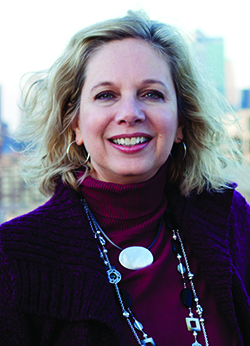HER2+ Breast Cancer Survivor
Survivor Learns the Importance of Accepting Help

At 55, Denise Cunningham enjoyed reading, participating in church activities and having fun with her family and friends. When she first received her breast cancer diagnosis, she was overwhelmed but decided she wanted to be viewed as “normal” as possible, despite the disease. Over time, though, Denise learned the importance of accepting help from others, which is part of what led her to give back through advocacy work. She now shares her story publicly and stresses the importance of self-education and relying on others when in need.
A routine mammogram followed by a biopsy confirmed I had ER+/PR+/HER2+, Stage IIA invasive ductal breast cancer. After my diagnosis, I crawled into bed and started to compartmentalize. I was in a fog and felt numb, overwhelmed and completely unprepared for dealing with cancer. But who doesn’t?
The news also had a profound effect on my husband, parents and daughter. I think my parents were more frightened than I was in the beginning. But I did a lot of reading and research, and shared information with my family to help us all realize I was going to be able to do this cancer thing! We also reached out to our pastors and church family, and they all rallied around us in loving support and encouragement.
I was fortunate to have an instant rapport with my medical oncologist and radiation oncologist, and I didn’t feel it was necessary to get a second opinion. I was confident in the treatment plan they proposed.
My surgeon performed a lumpectomy to remove the tumor, along with a sentinel node biopsy to check for cancer spread (fortunately, there was none). Because I was HER2+, it was necessary for me to have chemotherapy followed by targeted therapy.
The chemo was the scariest part of breast cancer for me. Even though the side effects were tough at times, I learned how to manage the fatigue, nausea and even the hair loss. I think losing my hair was more traumatic for my 5-year-old granddaughter than it was for me! She was having no part of a hairless grandmother!
I think that was when the reality of cancer hit me, too. I looked into the mirror and realized, “I really am a cancer patient.” But even that went away with time when I started having fun with wigs and scarves! I had been desperately trying to hold onto the “normal” Denise and convince the world I was still the same person. But that became too exhausting, and I finally accepted the changes and let people help me when I needed it.
After chemo, I had 35 radiation treatments, followed by targeted therapy infusions for a year. The radiation burns were painful, but I found that a special gauze and ointment helped tremendously.
If chemo is going to be part of your treatment plan, I suggest that you take someone with you to the infusion suite — a chemo buddy. It’s good to have someone there to help keep your spirits up. Wear comfortable clothes, and bring your tablet, your books or your magazines to keep you busy. I always took my pillow and blanket, too. Sleep as much as you can during treatments.
Other than being a wife, mother and businesswoman, I’m also a patient advocate. I’ve shared my story publicly with people of all ages, and the response I get never ceases to amaze me. One high school student sent me a thank you card to tell me he had reached out to an aunt who has breast cancer after hearing my story. I can’t tell you how good that made me feel. To know I’m part of a positive chain reaction is important, as I’d like to perpetuate more good into the world of cancer to cancel out some of the bad.
My treatment will continue for the next several years while I take hormone therapy. My doctor and I discussed stopping the treatment when I recently reached the five-year mark, but we decided to continue for another two to three years with frequent checkups. I’m a research-driven person, so I am very comfortable with that. If the data show that hormone therapy for longer than five years doesn’t make a difference, then I will stop. I don’t want to be on treatment just for the sake of treatment.
You can do this, too. Lean on others and look to God to get you through.


